Perfect days
a retrospective
E lucevan le stelle. Never again will this happiness return just this way. Anamnesis both fulfills and lacerates me. *1
On February 7th, at day’s close, P and I emerged from Cine Verdi, carrying a film that would echo through our conversations for months
"I miss Japan." "Yes yes, I miss it too. We have to go back." "What a lovely movie, no?" "Yeah, it was. But... don't you think Hirayama is lonely? Possibly, deeply sad?"
On February 7th, the sound of a vending machine dispensing coffee at 6 AM Tokyo time became part of our memory. We were watching Hirayama then as his days unfolded in their quiet persistence. Every morning, the tender greeting of his plants, their leaves catching light in that small Tokyo apartment. The drive to work punctuated by his music - mechanical, reliable, somehow pure. A bento carried to high ground, where he sits among trees that dance around casting shadows on his solitude.
We watched Hirayama repeat the same ritualistic day for a week. We observed the few random encounters he had with others, a small glimpse into his family life. Small glares of his narrative.
My friend saw beauty in Hirayama's existence - his reverence for all things living and still, his embrace of simplicity, his gratitude. In Wenders' hands, Hirayama's life unfolds as precise artistry, a work of art executed as it is, simply and meticulously.
I saw only the sadness beneath. Here was a man who had retreated to life's passive offerings, shying from the labor of human connection. In his wounds, I recognized a deliberate withdrawal.
Hirayama is heartwarming with strangers; he greets the owners of his regular places with a smile and tries to be of help for those who need it. He has no close friends, no partner, no relationship with family except a niece who looks up to him in ways he can't always deliver. His sole companions are music, books, and the beauty of Tokyo.
On February 7th and months ahead, P and I agreed to disagree.
On the morning of April 4th, I met Sammy at a small plaza. I had avoided this encounter in every way possible - consciously, subconsciously, and all the logical and psychological spaces between. I was unprepared to hear anything hurtful. On April 4th, I pulled up the courage to attend the final communion of our romantic connection. Amongst the exchange of latest news, we finally got to the dreadful part. 'I am now dating this other person, she's the ex I told you about, I am still in love with her,' he said while an 'I'm happy for you' came out with forced enthusiasm. Suddenly Hirayama's life became a door swinging open, inviting me in.
Later that day, I signed the lease to a new place, and a few weeks later I was making boxes and collecting items. I said goodbye to an idea of a life with one of my best friends, with whom I had lived for something little over three years. There were times we really thought we'd grow old together, like siblings who can't move away from the family house. We still call ourselves the climbing-cafe-literary society.
On April 4th, I carried my body around, had lunch with colleagues, stood weirdly spaced out, excusing myself: 'Sorry, yeah, you know, this house thing, not sure if it's the right one, I need to think...'.
At day's end, I walked myself to the bus and got off at the wrong stop, which thankfully led me to Periplo, a tiny Greek restaurant closing down after ten years in business. The owner of the place had become greedy and was kicking them out. Pausing right outside, I worked up the courage to smile and say a proper farewell.
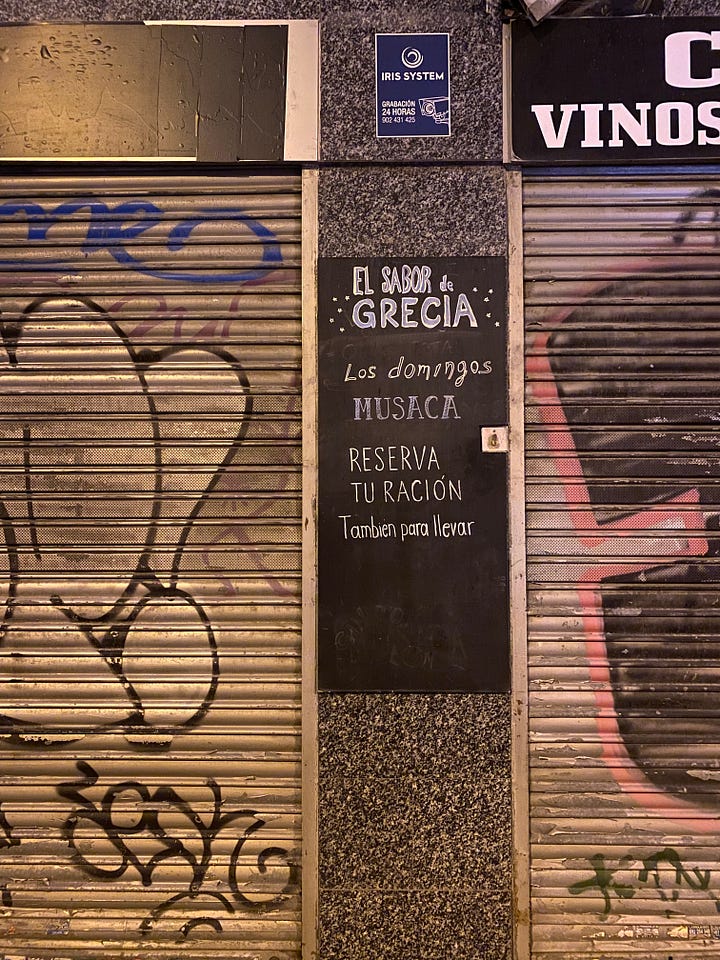

Distressed with their situation but still proper hosts until the end, they offered me a beer and served it before I had time to decide whether I could afford a few more minutes of forced politeness. I sat with them amongst trash and glasses and cutlery, boxes and cooking utensils. We caught up on our news, the current state of a rapidly changing Madrid, our thoughts on the return to the homeland. By the third beer, I was already developing a second brain, one where the morning's events never happened.
Amidst speedy exchanges of Greek mixed with Spanish words, a neighbor showed up. We turned around looking at him with a mix of cheeriness and annoyance. How dare you interrupt our flow of thought, Spaniard?
His name was Guillermo, a soft-spoken man who had eaten at the restaurant with his family for as long as he remembered it in the neighborhood. 'My boys grew up with your food, what a pity...' he would repeat a few times before they offered him a beer as well and pulled out another chair for him to join our little group.
Another hour, amongst the company of strangers with a couple more rounds of beer on the house, I declared April 4th a perfect day.
I surely admire Hirayama's ability to find contentment in his chronic solitude. When we feel we don't belong anywhere or with anyone, we must turn our gaze wider. We belong to this earth and this cosmos first and foremost. Mother nature, or force, or spirit has placed us here alongside all other species - animals, flora and fauna - and the stars on a dark night can be our fellow travelers. Yet in my head, that thought alone doesn't soothe any of our loneliness. It complements us, yes; without it the horizon grows darker, but still that is not all there is.
What is life if we cannot connect with others? If relationships of any kind lead us into lengths of reclusion. When connection costs us so much. Do I look at Hirayama with admiration or with pity?
Around April 14th, R marked our memory with a curious exchange of gifts. I now hold dear a little book of his making - sketched and hand-bound, The Lost in Translation draft script. I've placed this scene in a small drawer in the library of my mind; when I pull it out, it illuminates entire rooms. The love for a person and a craft, the love for love itself. It materializes and transcends, living on and giving, giving, giving.
I now know that his love, once offered to me, had found its way to another - proof that true love doesn't dissipate but flows onward like a river finding its path.
On August 6th, the Day of the Savior in Greece, we introduced P to a local festivity in the port of Avlaimonas in Kythera. Before the wine could overwhelm us, we played matchmakers - there, a girl we decided with Tasos was perfect for our Spanish friend. Long hair, blue eyes, skin kissed by the Mediterranean sun. But the fun took over - the swirling crowd, the capable dancers - and we dismissed Eros from our minds. Tasos made P promise to visit again next year, this time to Ikaria. They shook hands, and I reminded P that in Greece, such a gesture probably carries more weight than marriage vows.
In the early hours of August 7th, we dragged our wine-heavy bodies to a local kiosk overlooking the rocky beach. 'Look,' Tasos whispered, and there in the downward spiral of rocks we saw her - the girl with the blue eyes.
She walked ahead, while entranced, the boy followed toward his doom. At the sea-stairs' summit, she calmly shed her clothes and entered the deep.His hesitation lasted one breath before the tide called them both. From above, we watched them embrace, their bodies turning silver in the dark water, floating as one, toward a place we all wished to be that night.
We looked at each other, smiling wide, silent witnesses to Eros' quiet work— no matchmaker needed.
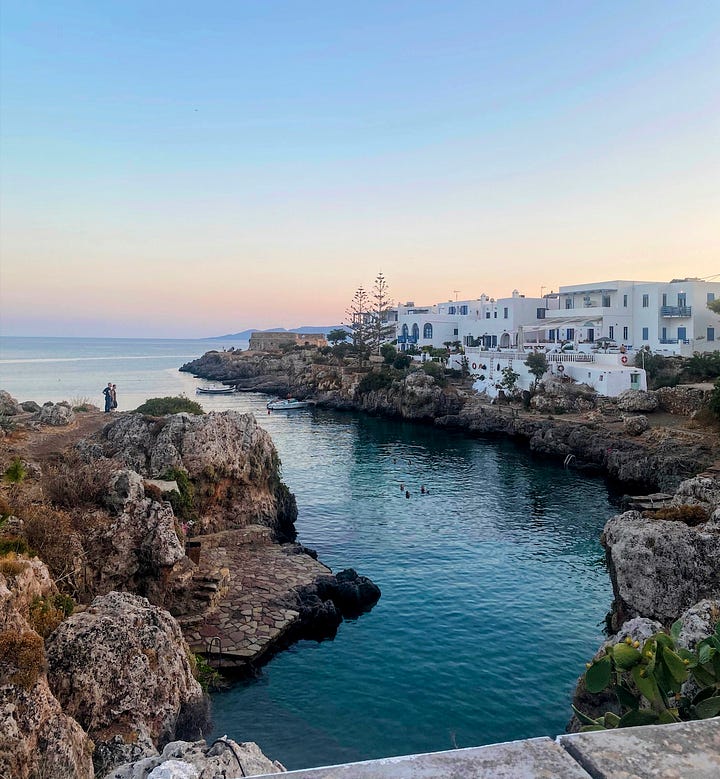
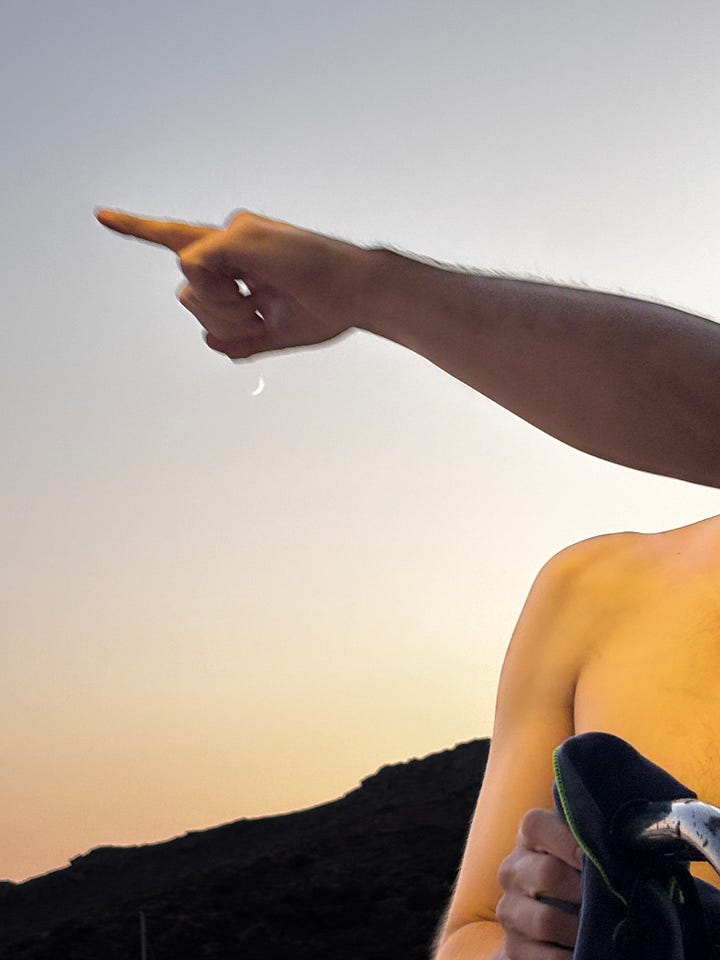
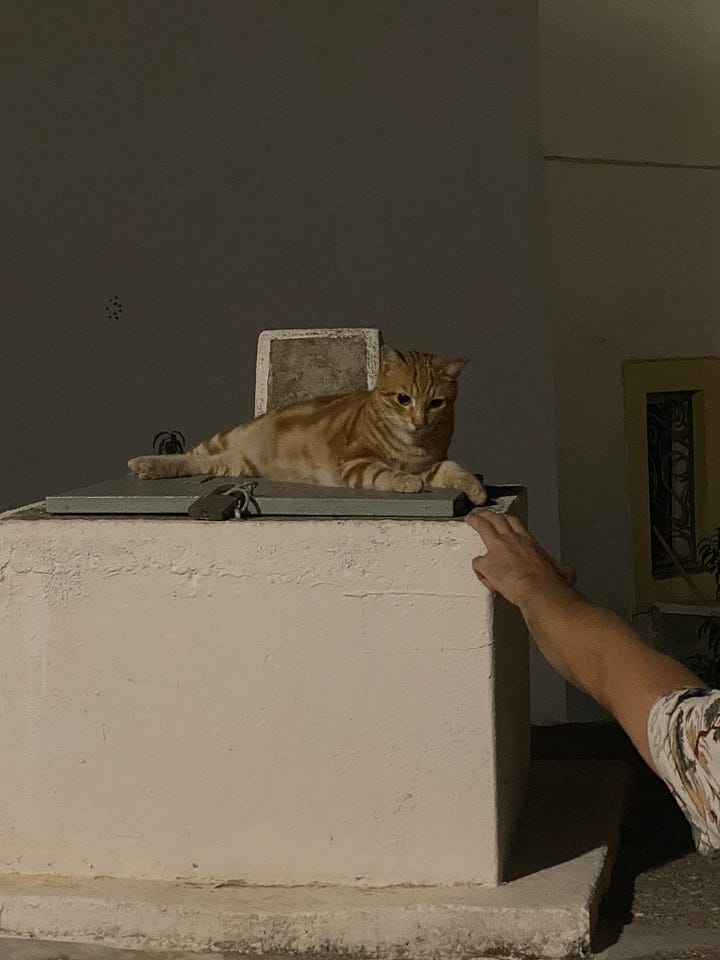
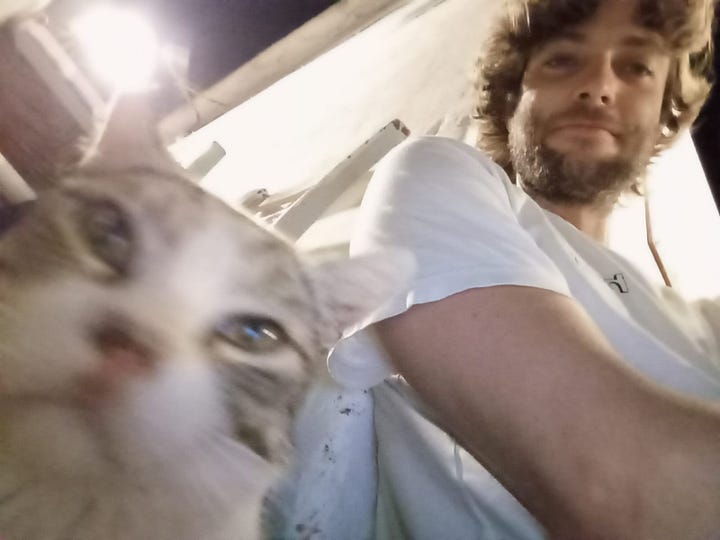
On October 6th, I entered a driverless car in downtown San Francisco. It asked me if I liked the music and if the temperature was appropriate. My companion pointed out that the price of our ride would be equal to an Uber or a Lyft. I found myself wondering what I would prefer if I lived here, coming back from a night out: someone to ask me how my night was and go on about the perils of the economy, or a vehicle that would let me drift off in peace. There are days and days, I suppose.
I’m happy to report that visiting the bookshop that Alen Ginsberg’s Howl and other poems was first published beat the ghost car experience.
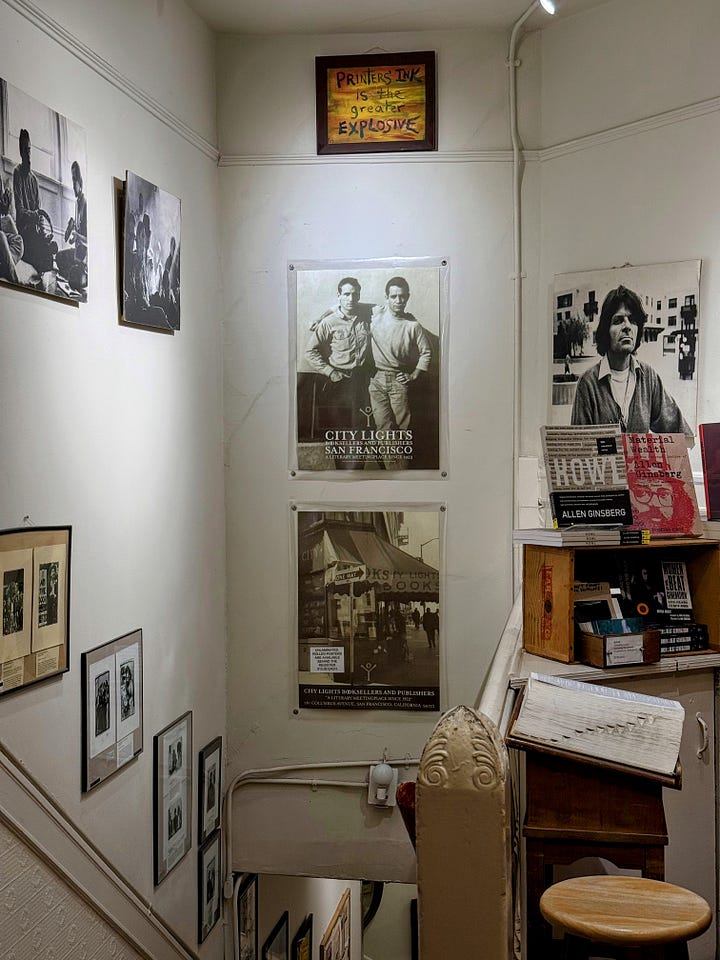
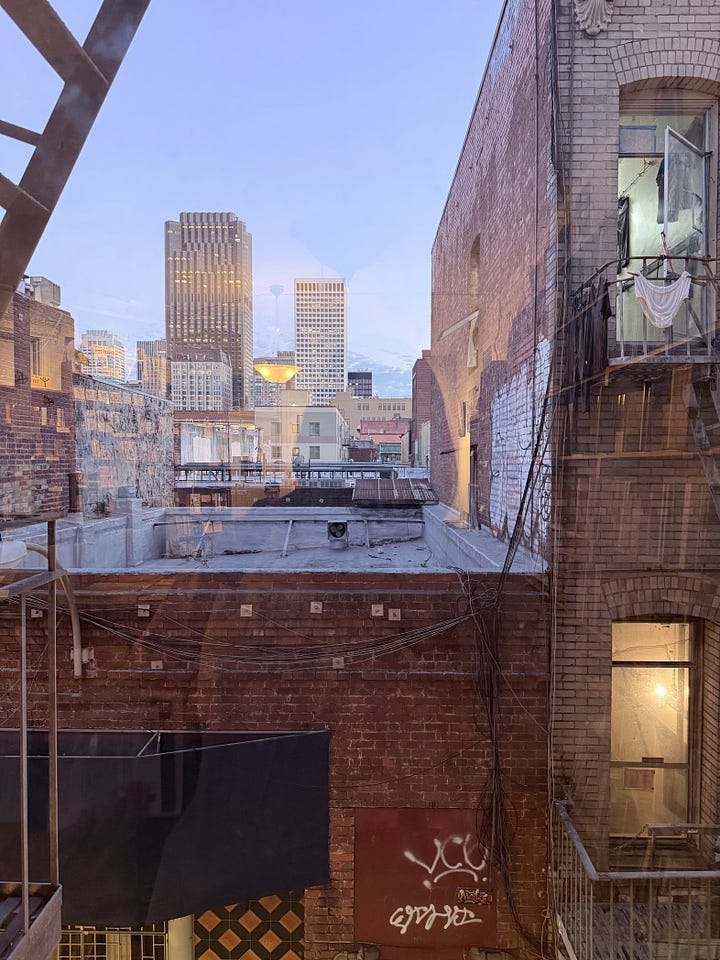
A month later, on November 7th, I visited the forest of the Kotai temple at Ise. I was overwhelmed by the beauty of the place and convinced myself that the monastic life, for certain periods of time, is not such a bad idea. One thing I give to Wenders' Hirayama is that he spends enough time just listening.
Earlier that month I wrote to my new pen-pal friend about my lack of words this past year: 'This lack of something to say doesn't come from a depressive state or feelings of inferiority. It's as if I'm trying to pause and listen—or perhaps to not listen for a while, until I can truly, deeply listen. I've spent most of my life trying to understand existence and humanity through the lens of established systems of thought. I've often sought reassurance in my thinking, and even when I outgrew one system for another, I was left with a persistent sense of dissatisfaction. Every "system of thought" seems right—until it doesn't.'
I'm getting better at just listening, paying attention. To the noise of this earth and the noise within me, my dreams, which I've now become a beggar for. In turbulent times, when I can't pinpoint what's wrong, I close my eyes at night and hope they'll show me what matters.
This year was both painful and beautiful, aligning perfectly with what life ought to be in my system of thought. Every cup of wine raised with friends birthed both gratitude and conscience: thankfulness for my own freedom, and a burning wish for those trapped in warzones and unfair political games.
Those of us living in relatively democratic societies - a notion itself constantly in flux - carry an obligation: to resist the slide into authoritarianism not just in our politics, but in our daily lives - to recognize how we sometimes become our own tyrants, imposing small dictatorships in our relationships, our habits, our ways of loving. And while Hirayama's life holds its own beauty and peace, I cannot yet retreat into such sanctuary.
As I set the table for 2025, I wish for health and love, for eros and friendship, for memories that won't make sense just yet but will spark the need to dance them away at some Greek summer festival, under stars that have seen it all before. Above all, I wish for gratitude, and when days grow dark, for gentle reminders that this - this unjust but beautiful life - is all we get.
all my love dear friends
G.
Roland Barthes from A lover’s Discourse



